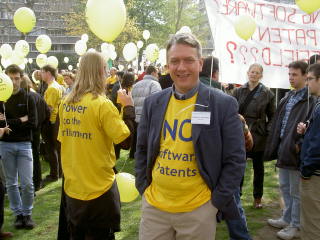
The Politics of Software Patents
Links
Software Patents: The Political Game
The initiative to the EU directive originally came from the lobbying groups that want to make computer programs patentable. The proposition was introduced as a purely technical "harmonization" that would not change anything. So there was no need to have any public debate about it, was the idea.This plan failed. In September 2003 there was a dramatic vote in the European Parliament, which resulted in a directive that said no to software patents.
That was a good thing, but unfortunately the story doesn't end there. Now the Council and the Commission in Brussels have reversed the Parliament's amendments, so that the result is a directive that says yes instead. By deviously omitting certain central definitions in the text, they are opening up huge loopholes in the directive, so that the patent lobby gets what it wants despite the Parliament's opposition.
This is not how democracy was meant to work, but this is what is happening.
Read more about the high-stakes political game.
Democracy May Not Be So Bad After All
When the Parliament had voted no to software patents in September 2003, the patent lobby was shocked. "It may sound undemocratic, but the [result of the vote] demonstrates that the issue [is] too complex to be left to the European Parliament" a patent attorney wrote. Instead he proposed that he and his colleagues should be allowed to write the law themselves, without any elected politicians meddling. Read an answer to him.Sweden's MEPs - Where Do They Stand?
Name and e-mail addresses to the 19 Swedish Members of the European Parliament, together with a record of where they and their respective parties stand on the issue of software patents.
Also contains answers from MEPs to the
European FFII Questionnaire
about the 4 key issues that separate the Parliament and Council proposals.
(In Swedish only)
How The Swedish MEPs Voted
In the vote on software patents that was held in the European Parliament on September 24, 2003, the Swedish parties voted like this:(s) and (m) voted for the introduction of software patents in Europe.
(v), (mp), (fp), (c) and (kd) voted against.
Sounds easy? Just wait until I've explained. :-)
(In Swedish only)
The Four Major Problems With The Council Proposition [pdf]
The Council's proposal means unlimited patentability for computer programs, despite claims to the contrary made by proponents of the proposal. Jonas Maebe at the University of Gent describes the four major flaws in the Council's proposal, which separates it from Parliament's version.

FFII.se, May 2004
The text is public domain.

 På svenska
På svenska